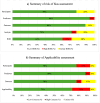Systematic review and meta-analysis of the role of machine learning in predicting postoperative complications following colorectal surgery: how far has machine learning come?
- PMID: 40844287
- PMCID: PMC12626580
- DOI: 10.1097/JS9.0000000000003067
Systematic review and meta-analysis of the role of machine learning in predicting postoperative complications following colorectal surgery: how far has machine learning come?
Abstract
Background: To systematically evaluate the clinical utility of machine learning in predicting post-operative outcomes following colorectal surgery.
Methods: A systematic literature search was conducted using PubMed, MEDLINE, Embase, and Google Scholar. Clinical studies investigating the role of machine learning models in predicting post-operative complications following colorectal surgery were included. Outcome measure was area under the curve for the model under investigation. The area under the curve and standard error were pooled using a random effects model to estimate the overall effect size. Statistical analyses were performed using the MedCalc (version 23) software, and the results presented as forest plots.
Results: Eighteen eligible articles were included. These reported outcomes on post-operative complications, namely anastomotic leak, mortality, prolonged length of hospitalisation, re-admission rates, risk of bleeding, paralytic ileus occurrence and surgical site infection. Pooled area under the curve for anastomotic leak was 0.813 [standard error: 0.031, 95% confidence interval (0.753-0.873)]; mortality 0.867 [standard error: 0.015, 95% confidence interval (0.838-0.896)]; prolonged length of stay 0.810 [standard error: 0.042, 95% confidence interval (0.728-0.892)]; and surgical site infection 0.802 [standard error: 0.031, 95% confidence interval (0.742-0.862)], respectively.
Conclusion: Machine learning methods and techniques are displaying promising clinical utility and applicability in accurately predicting the risk of developing complications following colorectal surgery. Future well-designed, adequately powered, multi-centre studies are needed to investigate the usefulness and generalisability of these novel approaches in optimising peri-operative surgical care.
Keywords: colorectal surgery; machine learning; post-operative complications; predictive modelling; systematic review and meta-analysis.
Copyright © 2025 The Author(s). Published by Wolters Kluwer Health, Inc.
Conflict of interest statement
None.
Figures
References
-
- Morgan E, Arnold M, Gini A, et al. Global burden of colorectal cancer in 2020 and 2040: incidence and mortality estimates from GLOBOCAN. Gut 2023;72:338–44. - PubMed
-
- World Health Organization. Colorectal cancer. Accessed February 2025. https://www.who.int/news-room/fact-sheets/detail/colorectal-cancer
-
- Warps AK, Tollenaar RAEM, Tanis PJ, Dekker JWT. Dutch ColoRectal Audit. Postoperative complications after colorectal cancer surgery and the association with long-term survival. Eur J Surg Oncol 2022;48:873–82. - PubMed
-
- Chiarello MM, Fransvea P, Cariati M, Adams NJ, Bianchi V, Brisinda G. Anastomotic leakage in colorectal cancer surgery. Surg Oncol 2022;40:101708. - PubMed
LinkOut - more resources
Full Text Sources




